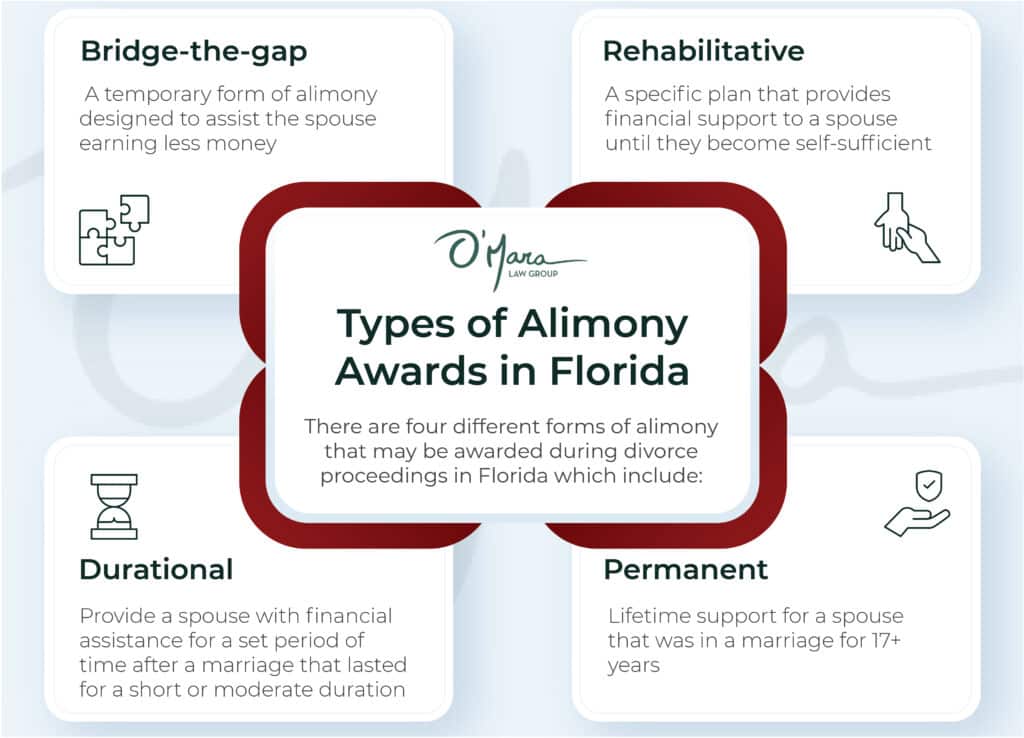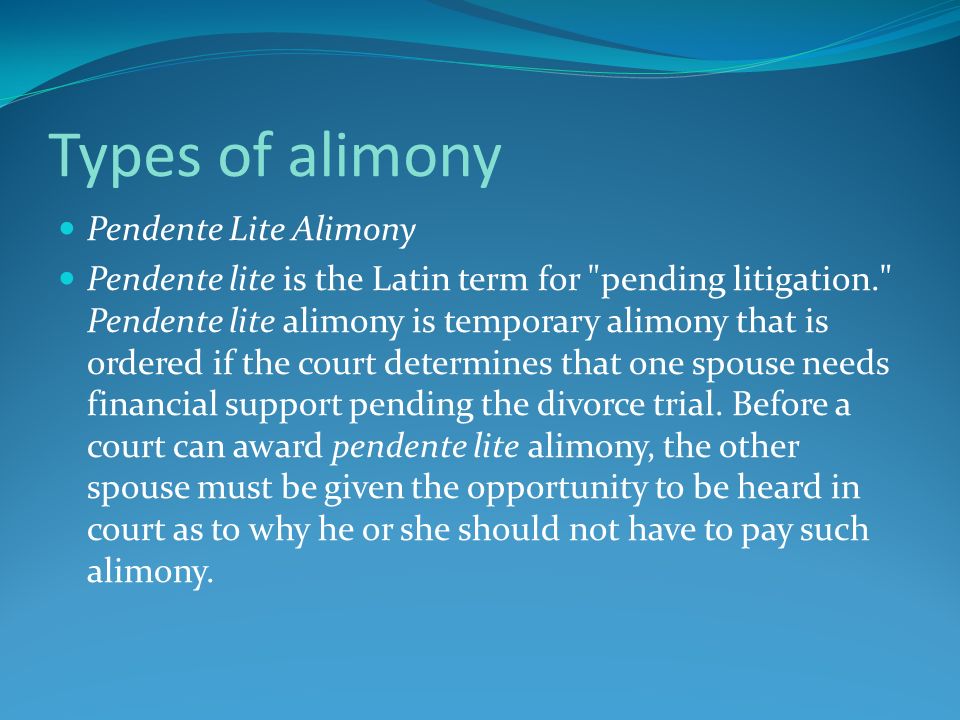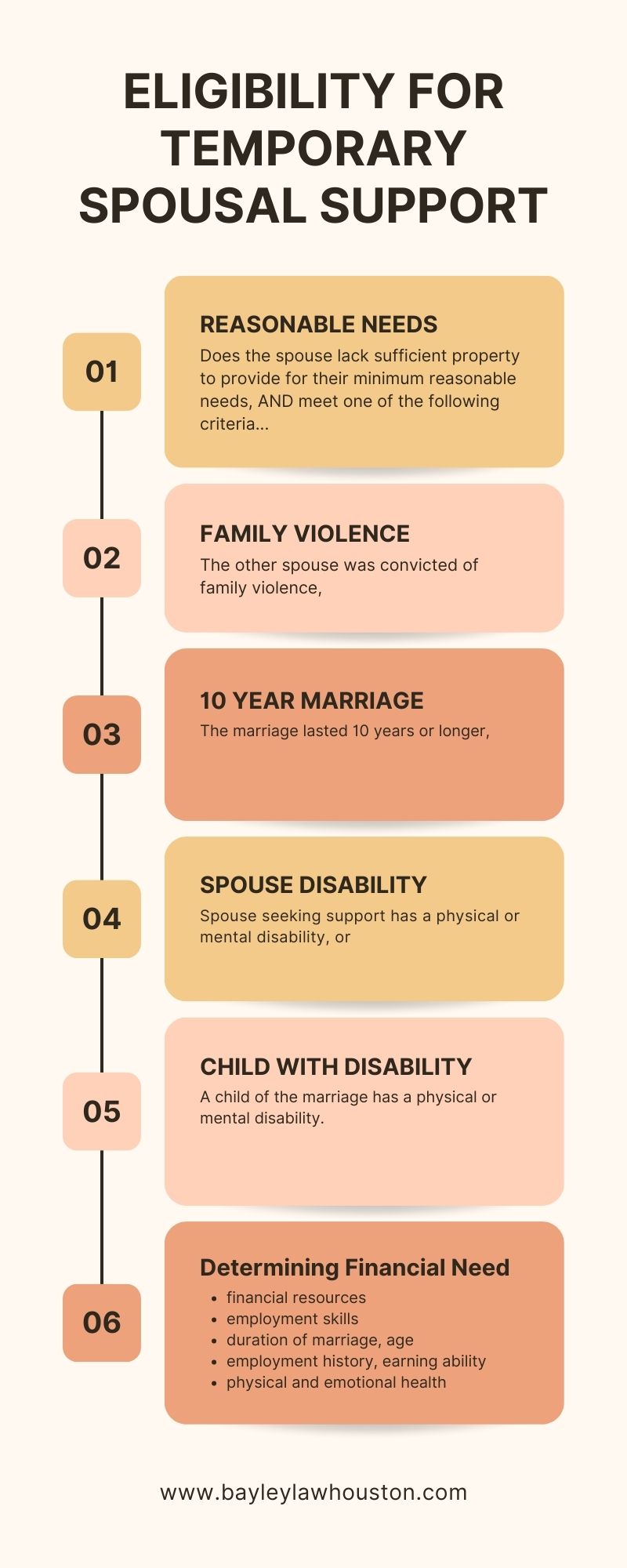Navigating Temporary Alimony in Florida Law
When going through a divorce or separation, one of the most critical aspects to consider is spousal support. In Florida, this is referred to as “temporary spousal support” or “temporary alimony.” Temporary spousal support is financial assistance provided to a spouse during the divorce process, often to maintain their standard of living until a final settlement is reached.
Temporary spousal support serves as a crucial bridge between separation and the finalization of a divorce. It ensures that both parties have the means to cover their basic needs and maintain their lifestyle during this transitional period. Understanding the laws surrounding temporary spousal support in Florida is essential for anyone navigating the complexities of divorce.
In this post, we will delve deeper into the specifics of temporary spousal support in Florida. We will explore the factors considered by the court, the duration of support, and the potential modifications that can be made in certain situations. By gaining a comprehensive understanding of temporary spousal support laws in Florida, individuals going through a divorce can navigate this aspect with confidence and make informed decisions for their future.
What is temporary spousal support?
Temporary spousal support, also known as temporary alimony, is a crucial aspect of divorce proceedings in Florida. It is a financial arrangement that ensures the dependent spouse receives financial assistance during the divorce process and before a final settlement is reached.
In simple terms, temporary spousal support is a provisional payment made by one spouse to the other to maintain a certain standard of living until the divorce is finalized. Its purpose is to provide financial stability and support to a spouse who may be economically disadvantaged or lacks the means to support themselves independently.
The amount of temporary spousal support is determined by various factors, including:
- the length of the marriage
- the earning capacity of both spouses
- the standard of living during the marriage
- the financial needs of the dependent spouse.
The court takes into consideration the income, assets, and expenses of each party to ensure a fair and reasonable support arrangement.
Temporary spousal support is distinct from permanent alimony, which may be awarded as part of the final divorce settlement. Temporary support is designed to bridge the gap between separation and finalizing the divorce, providing stability and financial assistance during this transitional period.
Types of Alimony Payments in Florida
Alimony is a court-issued payment made to one spouse by the other to provide financial support during and/or after a divorce. It is an important consideration for couples who are separating, and understanding the types of alimony payments available in Florida can help ensure that both parties are satisfied with the outcome.

Bridge-the-Gap Alimony
Bridge-the-gap alimony is intended to address issues such as relocation expenses and provide a transition period between married life and single life. This type of payment typically lasts no more than two years and cannot be modified once it has been finalized
Rehabilitative Alimony
This type of payment is intended to provide the recipient with the resources necessary to become self-supporting. Typically, rehabilitative alimony is only granted in situations where the recipient has the capacity to gain employment at some point in the future but requires additional training or education before they can do so. The duration and amount of this type of payment will vary depending on the individual’s goals.
Durational Alimony
Durational alimony is the most common type of payment in Florida, and it is intended to provide long-term support following a divorce. It differs from permanent alimony, which was abolished because it generally has an end date set at the time it is issued. Durational payments are intended to give the recipient enough resources to maintain their current lifestyle, although they may also receive additional adjustments depending on changes in circumstances.
Permanent Alimony
On June 30th, 2023, Governor Ron DeSantis signed SB 1416 – a major bill that will drastically alter the regulations governing alimony in the state of Florida. This momentous occasion comes after three prior attempts to pass similar legislation were blocked by the governor’s veto and the matter was a source of contention for more than a decade.
Under this new measure, the possibility of permanent alimony is abolished and the amount of alimony awarded during divorce proceedings is determined through a formula based on the length of the marriage. This significant shift away from permanent alimony brings much-needed clarity to the system and provides additional security for those seeking or receiving alimony payments.
This bill is highly anticipated among advocates and lawmakers alike and it marks an important step forward in the evolution of family law in Florida. Governor DeSantis’ approval signifies the state’s commitment to furthering financial protectiveness for those affected by divorce and serves as a testament to his dedication to improving the lives of all Floridians.
How is temporary spousal support calculated in Florida?
In Florida, temporary spousal support, also known as Alimony Pendente Lite or “temporary alimony,” is awarded during the pendency of a divorce proceeding. It is designed to maintain the financial status quo for both parties until a final determination on alimony is made. Understanding how this support is calculated is crucial for anyone going through a divorce in Florida.

Unlike durational alimony, which takes into account various factors such as the length of the marriage, the standard of living during the marriage, and the financial resources of each party, the calculation for temporary spousal support in Florida is more straightforward. It primarily focuses on the income of both parties.
The court considers the income of the requesting party as well as the supporting party. This includes wages, salary, bonuses, commissions, and any other sources of income. The court will also consider any potential income from assets or investments. It is important to note that temporary spousal support is not meant to be punitive or to equalize the parties’ incomes, but rather to provide financial stability during the divorce process.
To calculate temporary alimony, the court typically follows the guidelines set forth in Florida Statute 61.08.
In a proceeding for dissolution of marriage, the court may grant alimony to either party, which alimony may be bridge-the-gap, rehabilitative, durational, or permanent in nature or any combination of these forms of alimony.
These guidelines provide a formula that takes into account the difference between the parties’ incomes and the duration of the temporary support. The court may also consider factors such as the needs of the requesting party and the ability of the supporting party to pay.
It is worth noting that the court has discretion when determining the amount and duration of temporary spousal support. Factors such as the requesting party’s financial needs, the length of the marriage, and any other relevant circumstances may be considered. It is crucial to work with an experienced family law attorney who can advocate for your best interests when it comes to temporary spousal support.
Determining temporary spousal support
When it comes to determining temporary spousal support in Florida, the court takes several factors into consideration. These factors play a crucial role in ensuring a fair and equitable outcome during divorce proceedings.
Duration of the marriage
One of the primary factors considered is the duration of the marriage. Generally, longer marriages tend to result in higher temporary spousal support awards, as there is often a greater financial interdependence between spouses.
Earning capacity and financial resources
The court also takes the earning capacity and financial resources of both parties into account. This includes considering each spouse’s income, assets, and liabilities. Additionally, the court examines their potential for future earnings and the ability to maintain a similar standard of living post-divorce.
Age and health
The age and health of each spouse are also taken into consideration. If one spouse has health issues or advanced age that impacts their ability to work and support themselves financially, the court may award higher temporary spousal support.
Contributions made by each spouse
Next, the court evaluates the contributions made by each spouse to the marriage. This includes both financial contributions, such as income and property ownership, as well as non-financial contributions, such as child-rearing and homemaking. The court recognizes the value of these contributions and may factor them into the temporary spousal support decision.
Financial situation
Lastly, the court considers any other relevant factors that may affect the financial situation of the parties involved. This could include the standard of living established during the marriage, any prenuptial or postnuptial agreements, and the overall financial needs of each spouse.
Duration of Temporary Alimony in Florida
In Florida, temporary spousal support, also known as alimony pendente lite, is a crucial aspect to consider during divorce proceedings. This temporary support is designed to provide financial assistance to the dependent spouse while the divorce is pending, ensuring they can maintain their standard of living during this transitional period.
The duration of temporary spousal support in Florida varies depending on the specific circumstances of each case. Typically, it will last until the divorce is finalized or until a permanent alimony arrangement is established. However, it is important to note that temporary spousal support does not automatically transform into permanent support once the divorce is finalized.
How to Request Temporary Spousal Support in Florida
If you find yourself in a situation where you need temporary spousal support during the divorce process in Florida, it’s important to understand the steps involved in requesting it. Temporary spousal support, also known as alimony pendente lite, can provide essential financial assistance to a spouse who may be financially dependent on the other during the divorce proceedings.
To request temporary spousal support in Florida, you will need to follow certain procedures. Firstly, it is advisable to consult with a family law attorney who specializes in divorce cases. They will guide you through the legal process and ensure that your rights are protected.
- Once you have legal representation, your attorney will help you prepare the necessary documentation to file a motion with the court requesting temporary spousal support. This motion should outline your financial needs, the reasons why you require spousal support, and any relevant supporting evidence such as financial statements, pay stubs, and bills.
- After filing the motion, you will need to serve a copy of it to your spouse or their attorney. This ensures that they are aware of your request and have an opportunity to respond. It’s important to note that temporary spousal support is not automatically granted. The court will consider various factors, including the financial needs and resources of both parties, the duration of the marriage, and the standard of living established during the marriage.
- Once the motion is served, a hearing will be scheduled where both parties can present their arguments and evidence. It is crucial to be well-prepared for this hearing, as it can greatly impact the outcome of your request. Your attorney will help you gather the necessary evidence and present a strong case on your behalf.
- During the hearing, the court will evaluate the financial circumstances of both parties and make a determination regarding temporary spousal support. It is important to note that temporary spousal support is typically awarded for a specific period of time, during the divorce proceedings, until a final divorce settlement or judgment is reached.
Common Misconceptions about Temporary Alimony in Florida
When it comes to temporary spousal support in Florida, there are several common misconceptions that often lead to confusion and misunderstandings. It’s important to have a clear understanding of the laws and regulations to ensure a fair and just resolution during divorce proceedings.
Automatically Granted?
One common misconception is that temporary spousal support is automatically granted to one party. However, in Florida, temporary spousal support is not guaranteed and is determined on a case-by-case basis. The court takes into consideration various factors such as the length of the marriage, the financial resources of each party, and the standard of living established during the marriage.
Awarded to lower income spouse?
Another misconception is that temporary spousal support is only awarded to the non-working or lower-income spouse. While it is true that spousal support is often awarded to the financially disadvantaged party, it is not solely based on income. The court examines the financial needs and abilities of both parties to arrive at a fair and reasonable temporary support arrangement.
Permanent Arrangement?
Furthermore, some individuals believe that temporary spousal support is a permanent arrangement. However, as the name suggests, temporary spousal support is intended to provide financial assistance during the divorce process and for a limited period thereafter. The duration of temporary support is determined by the court, taking into consideration the specific circumstances of the case.
Modifying or terminating temporary spousal support
Modifying or terminating temporary spousal support can often become a necessity due to changing circumstances or the fulfillment of certain conditions. In Florida, the court allows either party to request a modification or termination of temporary spousal support if there is a substantial change in circumstances via Form 12.905(c) Supplemental Petition for Modification of Alimony. This can include factors like a significant change in either party’s income, employment status, or financial resources.
To initiate the modification or termination process, it is crucial to file a motion with the court. This motion should outline the reasons for requesting the change and provide supporting documentation such as pay stubs, financial statements, or any other relevant evidence. It is essential to demonstrate that the change in circumstances is substantial enough to warrant a modification or termination of the temporary spousal support order.
Temporary alimony orders are typically modifiable during the pendency of the divorce proceedings until a final judgment is reached. Once a final judgment is entered, the terms of spousal support may become permanent and may require a different legal process to modify or terminate.
In cases where both parties can agree on modifying or terminating temporary spousal support, they may opt for a mutually agreed-upon modification. This can be achieved through negotiation, mediation, or alternative dispute resolution methods. However, if an agreement cannot be reached, the court will make the final decision based on the best interests of both parties.
Important Considerations for Both the Payer and Recipient
When it comes to temporary spousal support, there are important considerations for both the payer and the recipient. Understanding these considerations can help navigate through this phase of the divorce process in Florida.
For the payer, it is crucial to assess their financial situation and capabilities. Temporary spousal support is typically determined based on the income and earning potential of both spouses. Factors such as the payer’s current income, assets, and expenses are taken into account. It is important to gather all relevant financial documents and consult with a family law attorney to ensure accurate and fair calculations.
On the other hand, the recipient of temporary spousal support should also be aware of their needs and expenses during this transitional period. This may include:
- housing
- healthcare
- childcare
- and other essential costs.
Have a clear understanding of the financial support required to maintain a reasonable standard of living.
Communication and negotiation between the payer and recipient are crucial during this stage. Both parties should engage in open and honest discussions to ensure that the temporary spousal support arrangement meets the needs of both individuals. Working with a skilled mediator or attorney can help facilitate these discussions and create a fair agreement.
Resources for further information on Temporary Spousal Support in Florida
In conclusion, navigating temporary spousal support in Florida can be a complex and challenging process. However, with a clear understanding of the laws and resources available, you can approach this matter with confidence and ensure a fair outcome for both parties involved.
To further deepen your knowledge on this topic, here are some reliable resources that can provide you with additional information and guidance:
- Florida Statutes: The official website of the Florida Legislature provides access to the state’s laws, including those related to spousal support. You can search for specific sections and clauses relevant to temporary spousal support to gain a comprehensive understanding of the legal framework.
- Family Law Attorneys: Consulting with an experienced family law attorney specializing in spousal support cases can provide you with personalized advice tailored to your unique situation. They can guide you through the legal processes, explain the intricacies of temporary spousal support, and advocate for your rights and interests.
- Legal Aid Organizations: If you are facing financial constraints, seeking assistance from legal aid organizations can be beneficial. These organizations provide free or low-cost legal services to individuals who meet specific eligibility criteria. They can offer guidance on temporary spousal support matters and help you navigate the legal system.
- Online Legal Resources: Various online platforms provide legal information and resources specific to Florida’s family law. Websites such as FloridaLegal.org and The Florida Bar’s Family Law Section can offer articles, FAQs, and downloadable forms relevant to temporary spousal support.
FAQ for Temporary Alimony in Florida
How long does temporary alimony last in Florida?
Temporary alimony will typically last until either a divorce is finalized or a court order is rendered that modifies or terminates the obligation. Unless specified as a fixed period of time, the duration of temporary alimony will follow the terms set by the court when it is granted.
What is temporary alimony in Florida?
Temporary alimony is also known as spousal support or alimony pendente lite and is used to provide financial assistance to one spouse while a resolution is reached in divorce proceedings. The goal of this assistance is to maintain the standard of living for both parties as they prepare for life after their separation.
What’s the difference is between temporary spousal support in Florida vs Texas?
As detailed above, in Florida, temporary spousal support, also called “temporary alimony,” can be awarded during the divorce process to provide financial assistance to the lower-earning spouse. The purpose of temporary alimony is to maintain the financial status quo and ensure that both spouses can cover their expenses throughout the divorce proceedings. Florida courts may consider factors such as the length of the marriage, the financial resources of each spouse, and the standard of living established during the marriage when determining temporary spousal support.

In Texas, however, temporary spousal support is only granted if the requesting partner’s assets don’t meet their minimal essential needs, AND they fall into one of the following categories: a history of family violence by the other spouse, ten or more years of marriage, physical or mental disability of the recipient partner, or a physical or mental disability in any child from the marriage.
How is temporary alimony calculated in Florida?
When determining temporary alimony, factors such as the length of the marriage, each spouse’s income, each spouse’s earning capacity, and each individual’s needs are all taken into consideration. This also includes other sources of income like investments, veteran benefits, unemployment benefits, retirement income, and more. The court will then establish an amount and payment schedule while the case is ongoing.
What are the different types of spousal support in Florida?
There are four types of spousal support available in Florida: bridge-the-gap, rehabilitative, durational, and permanent. Each type has its own set of criteria and requirements. Bridge-the-gap alimony helps transition one spouse from a married life to a single life. Rehabilitative alimony aids one party as they gain self-supporting capacity through job training or education. Durational alimony provides economic assistance to a former spouse for a specific period of time, and permanent alimony assists with necessary costs for an indefinite period.
Can temporary alimony be waived in Florida?
While there may be circumstances where a waiver may be approved by the court, such as if a spouse cannot afford to pay due to financial difficulty, generally, a waiver is not something that is ordinarily allowed.
What are the alimony laws in Florida in 2023?
Alimony laws in Florida 2023 have remained relatively unchanged since 2019 when a new law was enacted. Under the new law, a prescriptive guideline formula must be used to determine payments but courts are still able to modify any agreements based on unique circumstances. Furthermore, caps were placed on certain types of alimony payments and lump sum awards were reduced significantly.
What is the limit for alimony in Florida?
As established by the 2019 law mentioned above, durational alimony and bridge-the-gap alimony have been capped at no more than the length of the marriage or two years respectively. Lump sum awards are now limited to three times the total amount of all durational alimony payments due during marriage. However, these limits may be adjusted according to individual circumstances.
How long after a divorce can you ask for alimony in Florida?
Generally speaking, you can make requests for temporary or permanent alimony at the time of filing for divorce or shortly thereafter; however, you may not file for modifications for one year from the date of your judgment.
Can you get alimony after 1 year of marriage in Florida?
Yes, it is possible to receive alimony after a short marriage in Florida; however, it would be up to a judge to determine if your situation meets the requirements under state law. It is important to note that if your marriage lasted less than seven years and you do not have children together, a request for permanent alimony may be denied.
Do you have to pay alimony forever in Florida?
No, most types of alimony are considered temporary and are only paid for a set period of time as determined by the court. Permanent alimony is no longer awarded in Florida as of 2023.
What is a wife entitled to in a divorce in Florida?
In Florida, wives are typically entitled to equitable distribution of marital assets including property acquired during the course of the marriage. Additionally, she may also receive temporary or permanent alimony depending upon her individual circumstances.
Does Florida enforce alimony?
Yes, Florida enforces alimony payments unless otherwise directed by the court or agreed upon between spouses who have already divorced. If an ex-spouse refuses to make payments or falls behind, they may face legal action which could include wage garnishment or liens being placed against their assets.




